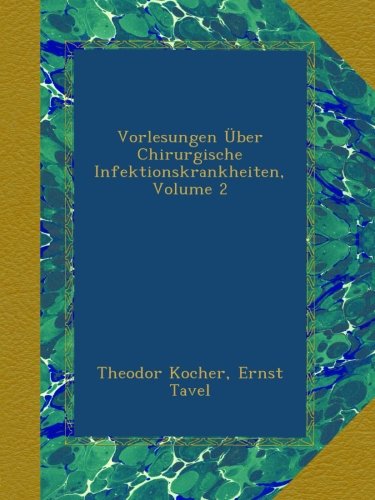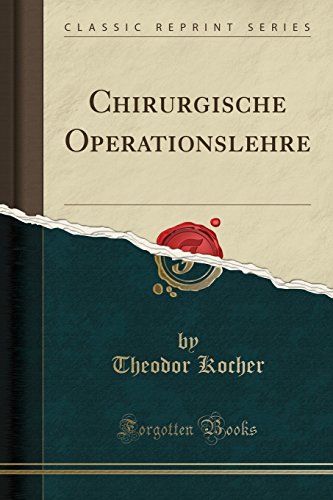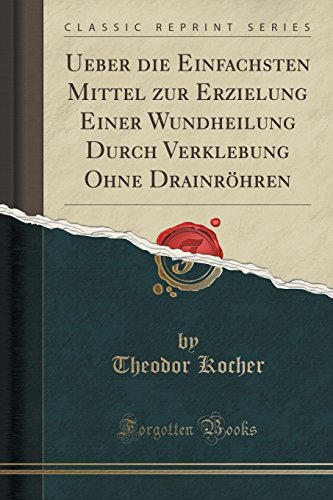Ueber die Einfachsten Mittel zur Erzielung Einer Wundheilung Durch Verklebung Ohne Drainröhren (Classic Reprint) (German Edition)
(Excerpt from Ueber die Einfachsten Mittel zur Erzielung E...)
Excerpt from Ueber die Einfachsten Mittel zur Erzielung Einer Wundheilung Durch Verklebung Ohne Drainröhren
Operationen die allerschwierigsten und verschiedensten Eingriffe zu ve1 zeichnen. Wir geben unten im Anhang eine Uebersicht der Operations fälle, soweit wir ausführlichere Krankengeschichten über dieselben zur Verfugung haben. Von Fällen, welche gegenwärtig noch in Behandlung sind, erwähnen wir nur zweier Ovariotomien, welche beide durch erste Verklebung binnen 8 Tagen geheilt sind; einer Excision des Larynx und Oes_ophagus in einer Länge von ca. 80m. Wegen krebsiger Erkrankung; einer Exstirpation einer Struma _maligna nebst einem Theile der Trachea. Der erste dieser Fälle ist fieberlos geblieben, bei dem zweiten ist die Wunde vollstandig aseptisch, dagegen besteht im Zusammenhang mit einer Périphebitis der Wade, welche schon vor der Operation bestand, hohes Fieberfi) Bei einer 65jährigen Frau wurde ein kindskopfgrosser seit langem bestehen-der. Ziemlich adhäre-ntcr Kropf herausgeschnitten und am 6. Tage aus der ohne Drainage per primam verklebten Wunde die Nähte entfernt; nur ein einziges Mal hat eine Temperaturerhöhung auf stattgefunden. Eine Doppel - Castration ist aseptisch geheilt; ebenso eine Radicaloperation einer Hernie durch vollständige Verklebung ebenso eine Excision eines Brustkrebses. Eine sehr grosse Schnittwunde am Arm mit Gangran der Muskulatur und sehr ausgedehnter Phlegmone hat sich in kürzester Zeit mit guten Granulationen bedeckt. Wir machen ausdrücklich aufmerksam, dass wir, während Wir im Anfang vorsichts halber gleichzeitig Carbolaus_spulungen und Auflegung von Carbolcom pressen mitbenutzten, theilweise auch Chlorzinkaussp-ülung der Wunde, in der letzten Zeit jede weitere Berührung der Wunde mit einem diffe renten Stoffe durchaus vermieden haben. Die Schwämme werden zwar in 10% iger Carbollösung aufbewahrt, aber vor dem Gebrauche in ge kochtem Wasser gehörig ausgewaschen, noch zweckmässiger fur die Wunden erscheint eine ige Kochsalzlosung, weil dieselbe noch in di?'ere1'1ter' ist. Instrumente und Finger werden in gewöhnlicher Weise mit 5 iger Carbollösung _desi.nficirt Wir können wohl behaupten, dass die vismuthbehandlung keiner der bishe1 ubli'chen Behandlungen zu1uck steht, dieselben ab_°e1 an Einfachheit der Anwendung und Sicherheit des Er folges, endlich an Unschädlichkeit bei weitem übert1i?'t denn das sei nach d1ücklich betont, dass wir seit E1nfuh1 ung der schw äche1n vismuth mixtur, speciell der 1%igen keine Andeutung der frühern nachtheiligen Folgen mehr zu constatiren gehabt haben.
About the Publisher
Forgotten Books publishes hundreds of thousands of rare and classic books. Find more at www.forgottenbooks.com
This book is a reproduction of an important historical work. Forgotten Books uses state-of-the-art technology to digitally reconstruct the work, preserving the original format whilst repairing imperfections present in the aged copy. In rare cases, an imperfection in the original, such as a blemish or missing page, may be replicated in our edition. We do, however, repair the vast majority of imperfections successfully; any imperfections that remain are intentionally left to preserve the state of such historical works.
http://www.amazon.com/gp/product/1333180675/?tag=2022091-20








